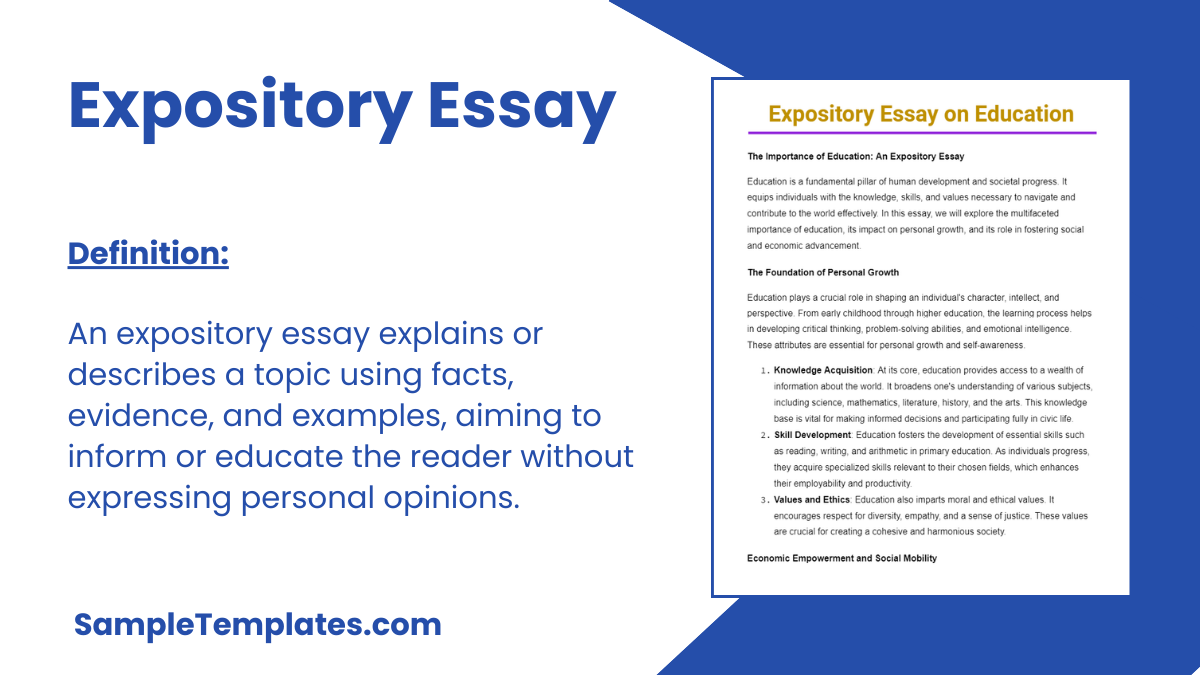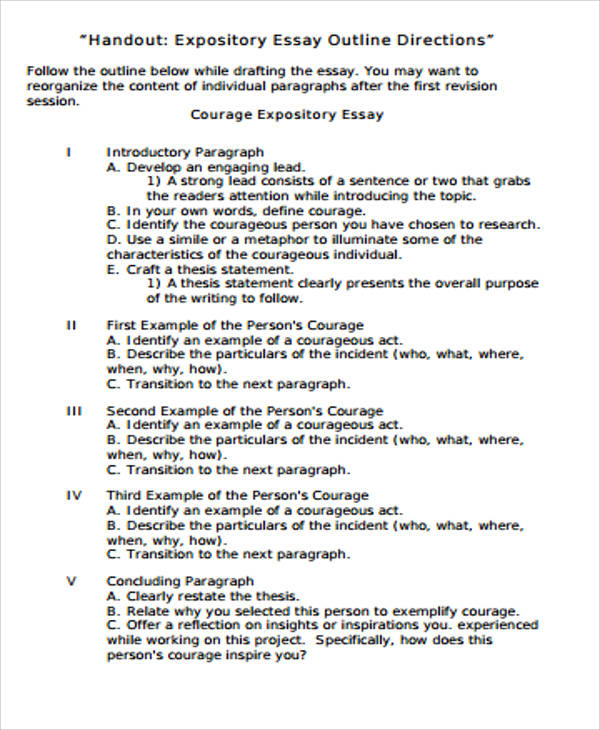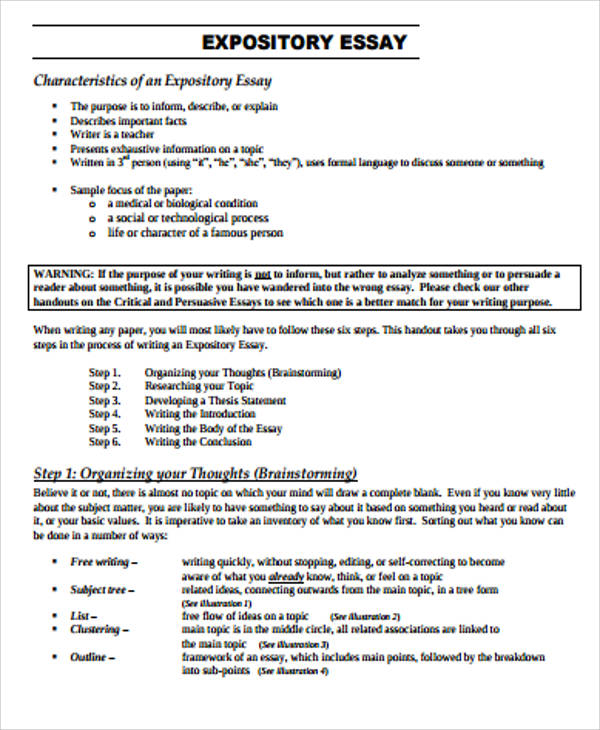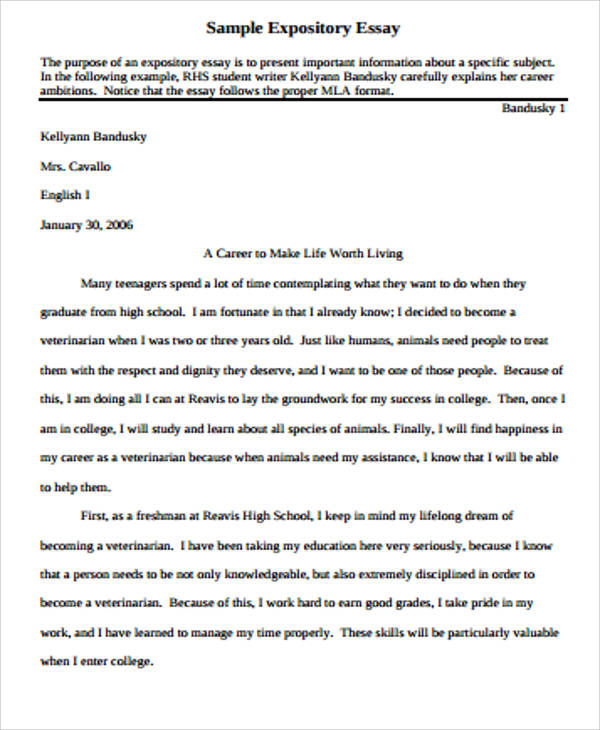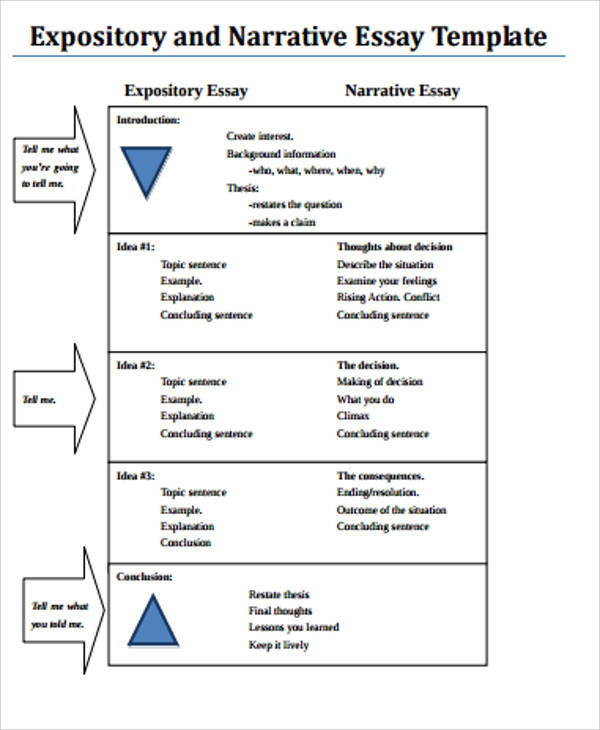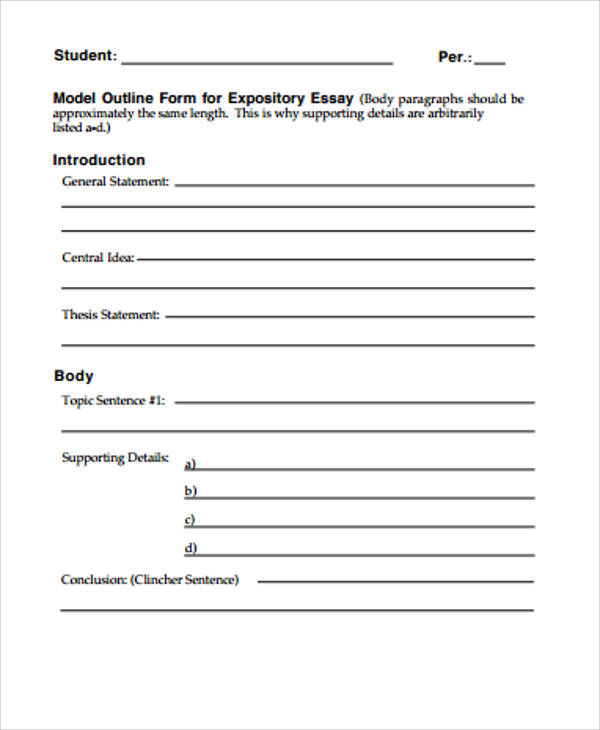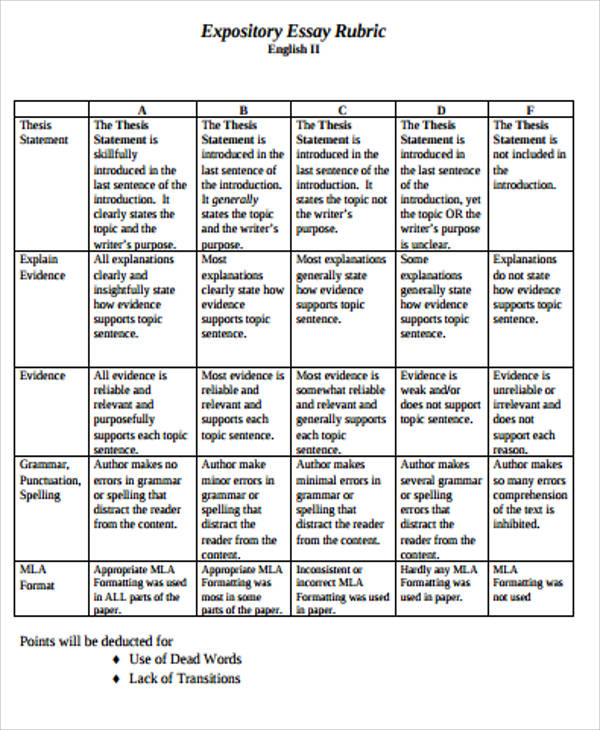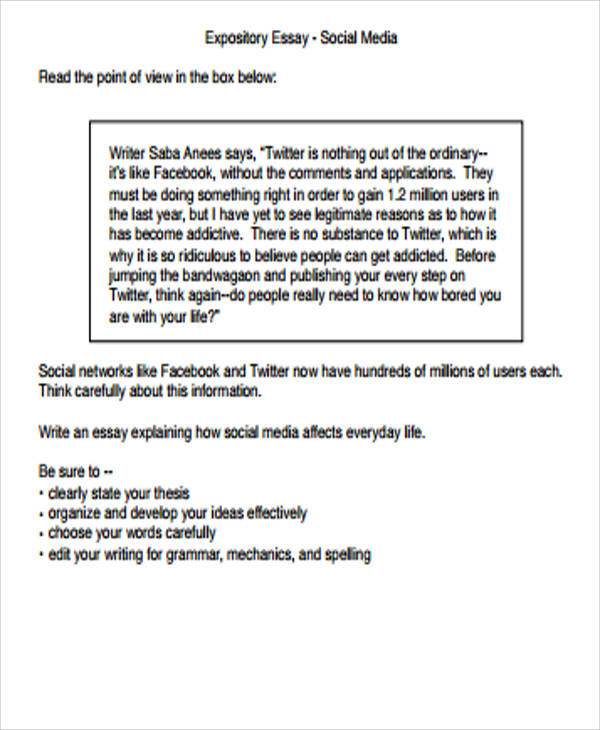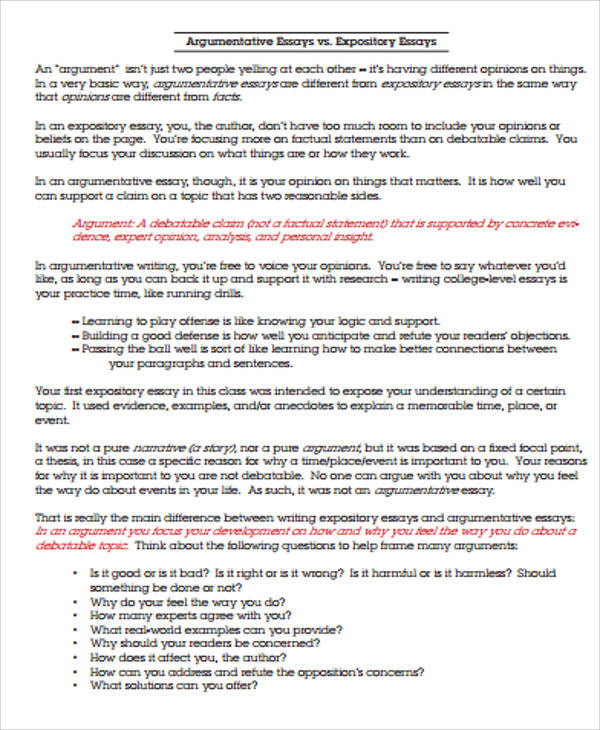An essay is a relatively brief piece of literary work on a specific topic. Most often, one’s first exposure to this type of writing would be during their early days in school when they are introduced to the five-paragraph structure, which contains the following parts:
-
An introduction that talks of the main idea and opens with a “hook” sentence
-
Three paragraphs for the body where evidence are presented. Each paragraph would contain an idea with grounds that support the main idea presented in the introduction.
-
A conclusion that restates the main idea and gives a sample brief summary of the supporting evidence. Basically, it wraps up the entire essay.
Check out these Sample Essays for a more in-depth guide on expository writing.
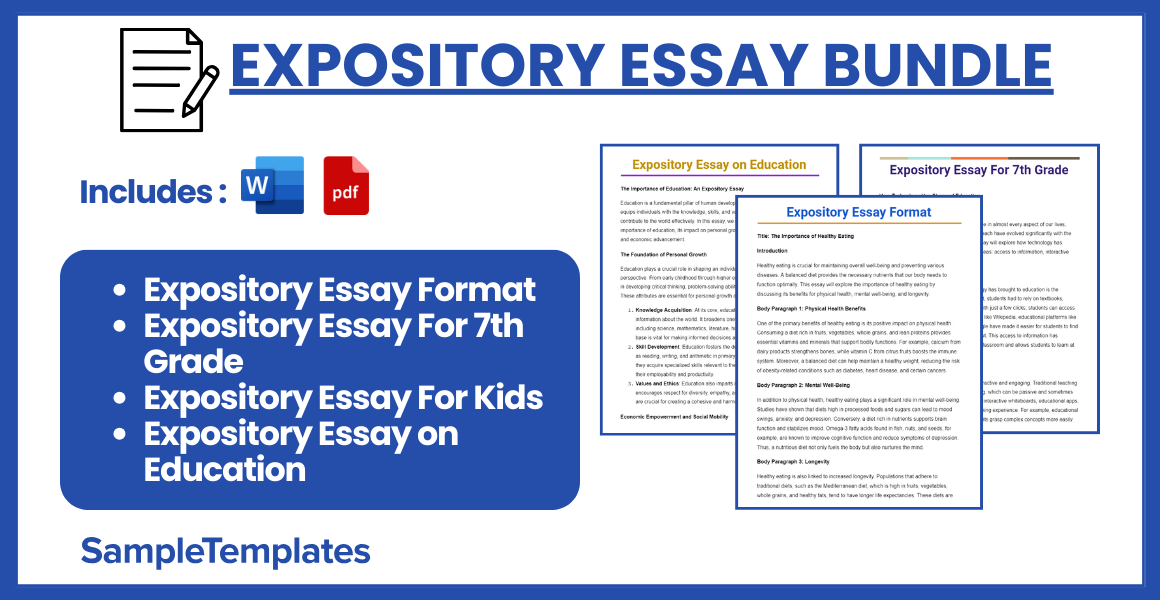
Download Expository Essay Bundle
Expository Essay Format
Title: The Importance of Healthy Eating
Introduction
Healthy eating is crucial for maintaining overall well-being and preventing various diseases. A balanced diet provides the necessary nutrients that our body needs to function optimally. This essay will explore the importance of healthy eating by discussing its benefits for physical health, mental well-being, and longevity.
Body Paragraph 1: Physical Health Benefits
One of the primary benefits of healthy eating is its positive impact on physical health. Consuming a diet rich in fruits, vegetables, whole grains, and lean proteins provides essential vitamins and minerals that support bodily functions. For example, calcium from dairy products strengthens bones, while vitamin C from citrus fruits boosts the immune system. Moreover, a balanced diet can help maintain a healthy weight, reducing the risk of obesity-related conditions such as diabetes, heart disease, and certain cancers.
Body Paragraph 2: Mental Well-Being
In addition to physical health, healthy eating plays a significant role in mental well-being. Studies have shown that diets high in processed foods and sugars can lead to mood swings, anxiety, and depression. Conversely, a diet rich in nutrients supports brain function and stabilizes mood. Omega-3 fatty acids found in fish, nuts, and seeds, for example, are known to improve cognitive function and reduce symptoms of depression. Thus, a nutritious diet not only fuels the body but also nurtures the mind.
Body Paragraph 3: Longevity
Healthy eating is also linked to increased longevity. Populations that adhere to traditional diets, such as the Mediterranean diet, which is high in fruits, vegetables, whole grains, and healthy fats, tend to have longer life expectancies. These diets are low in processed foods and high in antioxidants, which protect cells from damage. Furthermore, maintaining a healthy weight through balanced eating reduces the risk of chronic diseases that can shorten lifespan. By making informed dietary choices, individuals can enhance their quality of life and enjoy a longer, healthier life.
Conclusion
In conclusion, healthy eating is essential for maintaining physical health, supporting mental well-being, and increasing longevity. A balanced diet provides the nutrients necessary for optimal bodily functions, improves mood and cognitive function, and reduces the risk of chronic diseases. By prioritizing nutritious foods, individuals can lead healthier, happier lives and enjoy the benefits of improved well-being.
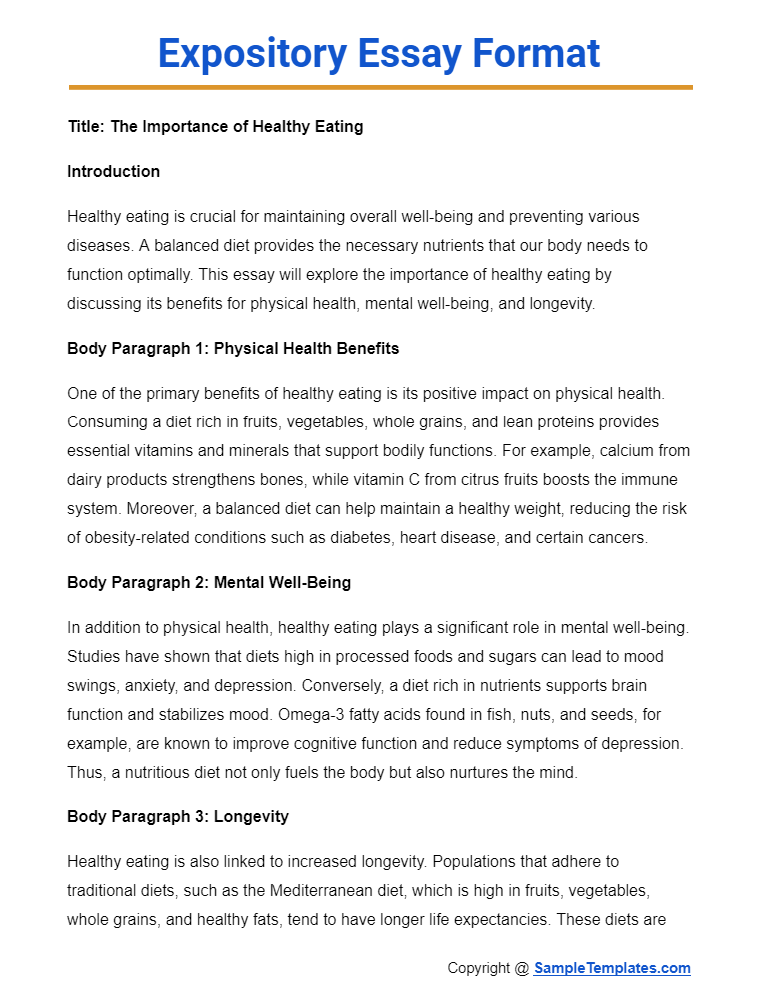
Expository Essay For 7th Grade
How Technology Has Changed Education
Introduction
In today’s world, technology plays a crucial role in almost every aspect of our lives, including education. The ways we learn and teach have evolved significantly with the advent of digital tools and resources. This essay will explore how technology has changed education, focusing on three main areas: access to information, interactive learning, and personalized education.
Access to Information
One of the most significant changes technology has brought to education is the accessibility of information. Before the internet, students had to rely on textbooks, libraries, and teachers for information. Now, with just a few clicks, students can access a vast amount of information online. Websites like Wikipedia, educational platforms like Khan Academy, and search engines like Google have made it easier for students to find information on any topic they are curious about. This access to information has expanded learning opportunities beyond the classroom and allows students to learn at their own pace.
Interactive Learning
Technology has also made learning more interactive and engaging. Traditional teaching methods often involve lectures and note-taking, which can be passive and sometimes boring for students. However, digital tools like interactive whiteboards, educational apps, and online quizzes have transformed the learning experience. For example, educational games make learning fun and can help students grasp complex concepts more easily. Virtual labs and simulations provide hands-on experience in subjects like science, allowing students to experiment and explore in a safe environment. These interactive methods keep students engaged and can improve their understanding and retention of the material.
Personalized Education
Another significant impact of technology on education is the ability to personalize learning. Every student learns differently, and technology allows for customized learning experiences that can cater to individual needs. Adaptive learning software analyzes students’ performance and tailors lessons to their strengths and weaknesses. For instance, if a student struggles with math, the software can provide additional practice problems and tutorials to help them improve. Teachers can also use technology to track student progress and provide targeted support where needed. This personalized approach ensures that all students have the opportunity to succeed, regardless of their learning style or pace.
Conclusion
In conclusion, technology has brought about substantial changes in education, making information more accessible, learning more interactive, and education more personalized. These advancements have created a more dynamic and inclusive learning environment, helping students to achieve their full potential. As technology continues to evolve, it will undoubtedly bring even more innovative changes to the field of education, further enhancing the way we teach and learn.
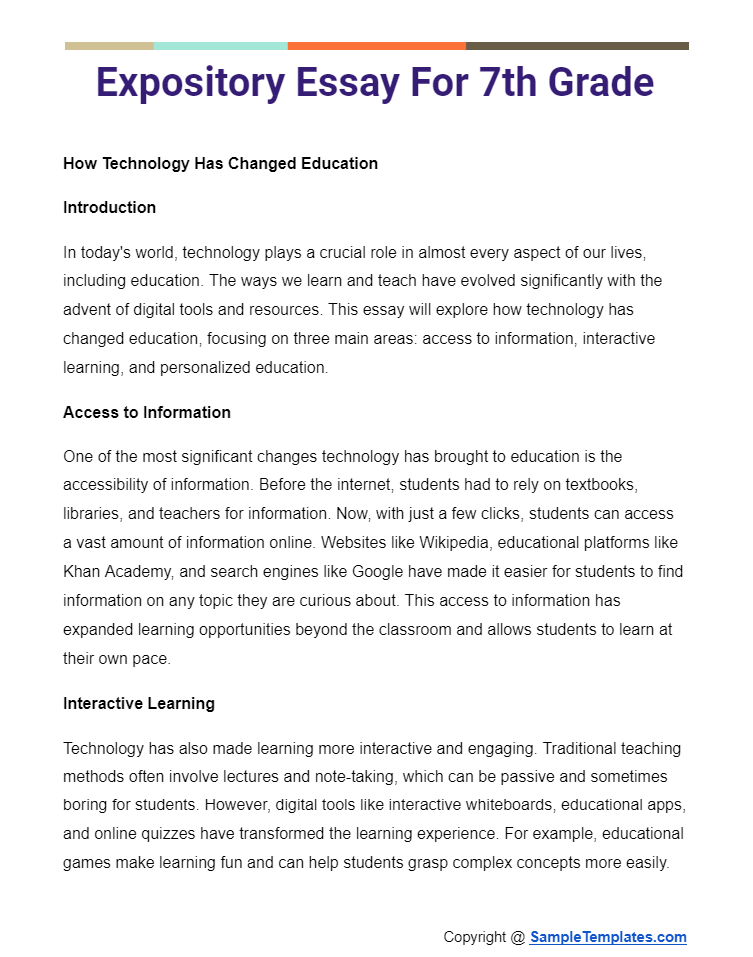
Expository Essay For Kids
The Wonderful World of Books
Books are like magical portals that can transport us to different places, times, and even worlds. They are filled with stories that can make us laugh, cry, think, and dream. For kids, books are an important part of growing up and learning about the world around them. Let’s explore why books are so wonderful and how they can help us in many ways.
Learning New Things
Books are full of information and knowledge. They can teach us about everything from the stars in the sky to the creatures in the deep ocean. When we read books, we learn new words and ideas. This helps us to understand the world better and become smarter. For example, a book about dinosaurs can teach us about the different kinds of dinosaurs that lived millions of years ago and what they ate. Reading books helps us do well in school because it improves our reading and writing skills.
Growing Our Imagination
When we read stories, our imagination grows. We can picture the characters, places, and events in our minds. This is like having a movie playing in our heads, but even better because we can imagine it just the way we like. For instance, when we read a fairy tale, we can imagine the magical castles, brave knights, and fierce dragons. This helps us to be more creative and think of new ideas, which is useful not just in school, but in life.
Making Us Feel Good
Books can also make us feel a wide range of emotions. A funny book can make us laugh, while a sad story can make us feel empathy for others. Reading books can be like going on an adventure without ever leaving our home. It can be exciting, scary, or heartwarming. For example, reading a story about a young hero who overcomes challenges can inspire us to be brave and never give up.
Connecting with Others
Books can also help us connect with other people. When we read the same book as our friends, we can talk about it and share our thoughts. This can make us feel closer to them. We can also learn about people who are different from us by reading books. This helps us to understand and respect other cultures and ways of life. For instance, a book about children in another country can show us how they live, what they eat, and what games they play.
Fun and Relaxation
Sometimes, the best thing about books is that they are simply fun to read. They can be a great way to relax and unwind after a busy day. We can curl up with a good book and let ourselves be carried away to another world. Whether it’s a thrilling adventure, a funny story, or a heartwarming tale, books can be our best friends.
Conclusion
Books are an amazing part of our lives. They help us learn new things, grow our imagination, make us feel good, connect with others, and provide fun and relaxation. So, the next time you pick up a book, remember that you are holding a gateway to a wonderful world of stories and knowledge. Happy reading!
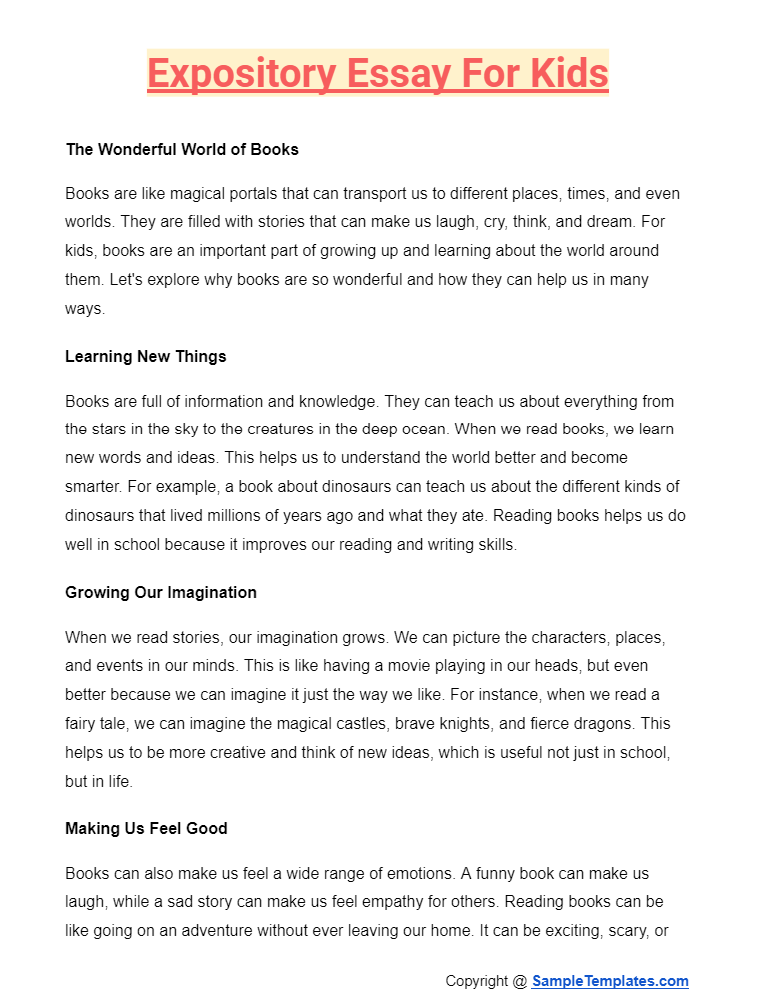
Expository Essay on Education
The Importance of Education: An Expository Essay
Education is a fundamental pillar of human development and societal progress. It equips individuals with the knowledge, skills, and values necessary to navigate and contribute to the world effectively. In this essay, we will explore the multifaceted importance of education, its impact on personal growth, and its role in fostering social and economic advancement.
The Foundation of Personal Growth
Education plays a crucial role in shaping an individual’s character, intellect, and perspective. From early childhood through higher education, the learning process helps in developing critical thinking, problem-solving abilities, and emotional intelligence. These attributes are essential for personal growth and self-awareness.
- Knowledge Acquisition: At its core, education provides access to a wealth of information about the world. It broadens one’s understanding of various subjects, including science, mathematics, literature, history, and the arts. This knowledge base is vital for making informed decisions and participating fully in civic life.
- Skill Development: Education fosters the development of essential skills such as reading, writing, and arithmetic in primary education. As individuals progress, they acquire specialized skills relevant to their chosen fields, which enhances their employability and productivity.
- Values and Ethics: Education also imparts moral and ethical values. It encourages respect for diversity, empathy, and a sense of justice. These values are crucial for creating a cohesive and harmonious society.
Economic Empowerment and Social Mobility
Education is a powerful tool for economic empowerment. It opens up opportunities for higher-paying jobs and careers, thereby reducing poverty and enhancing quality of life.
- Employment Opportunities: Individuals with higher levels of education are more likely to secure stable and well-paying jobs. They possess the skills and qualifications that employers seek, making them competitive in the job market.
- Innovation and Economic Growth: An educated workforce is essential for innovation and economic development. Education fosters creativity and the ability to adapt to new technologies and methodologies, driving progress and competitiveness in the global market.
- Social Mobility: Education is often regarded as a ladder for social mobility. It enables individuals from disadvantaged backgrounds to rise above their circumstances and achieve success. Scholarships and financial aid programs make education accessible to all, regardless of economic status.
Fostering Social Cohesion and Civic Engagement
Education promotes social cohesion by fostering a sense of community and shared values. It encourages active participation in civic life and informed citizenship.
- Civic Responsibility: Educated individuals are more likely to participate in civic activities such as voting, volunteering, and engaging in public discourse. They understand their rights and responsibilities and contribute to the democratic process.
- Cultural Understanding: Education exposes individuals to diverse cultures and perspectives, promoting tolerance and understanding. This cultural awareness is essential in an increasingly interconnected world, where collaboration and mutual respect are vital.
- Reducing Inequality: By providing equal opportunities for all, education helps to reduce social and economic inequalities. It empowers marginalized groups and promotes inclusivity, leading to a more just and equitable society.
Challenges and the Way Forward
Despite its numerous benefits, education faces several challenges that need to be addressed to maximize its potential.
- Access and Quality: Ensuring access to quality education for all remains a significant challenge, especially in developing countries. Investments in infrastructure, teacher training, and educational resources are crucial to bridging this gap.
- Curriculum Relevance: The curriculum must evolve to meet the changing needs of society and the job market. Incorporating digital literacy, critical thinking, and soft skills is essential for preparing students for the future.
- Lifelong Learning: Education should not be confined to formal schooling. Promoting lifelong learning opportunities through adult education programs, vocational training, and online courses is vital for continuous personal and professional development.
Conclusion
Education is a cornerstone of personal and societal development. It empowers individuals with knowledge, skills, and values, driving economic growth and social progress. By addressing the challenges and ensuring access to quality education for all, we can build a more equitable and prosperous future. Investing in education is not just a moral imperative but a strategic necessity for the well-being of humanity.
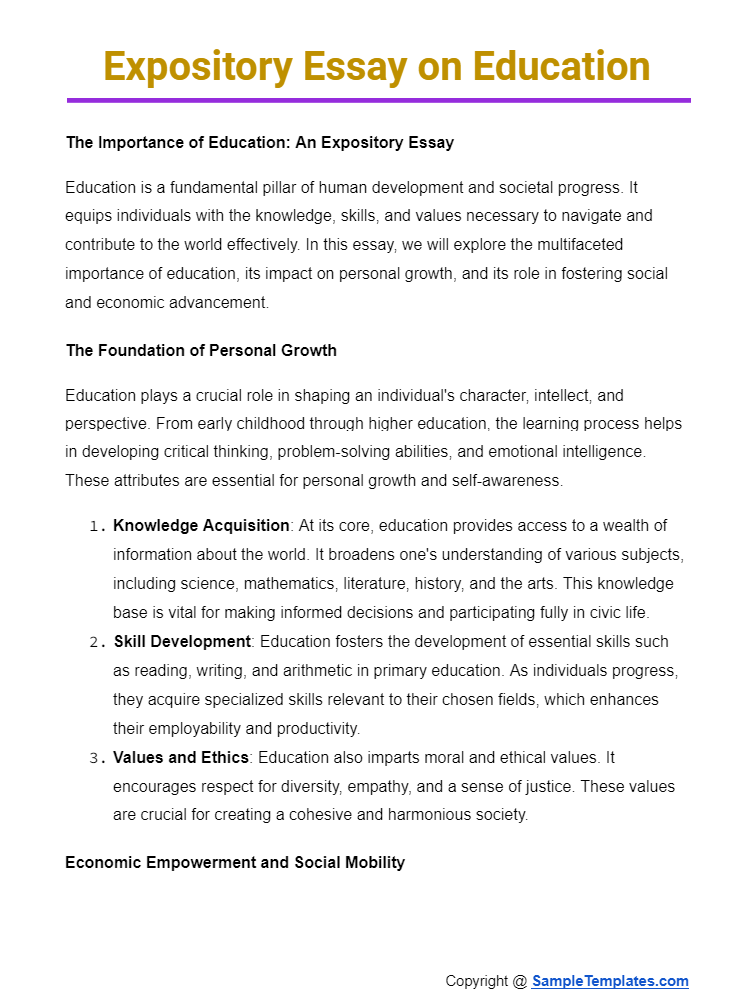
Browse More Templates On Expository Essay
Sample Expository Essay Outline
General Expository Essay Example
How to Write an Expository Essay?
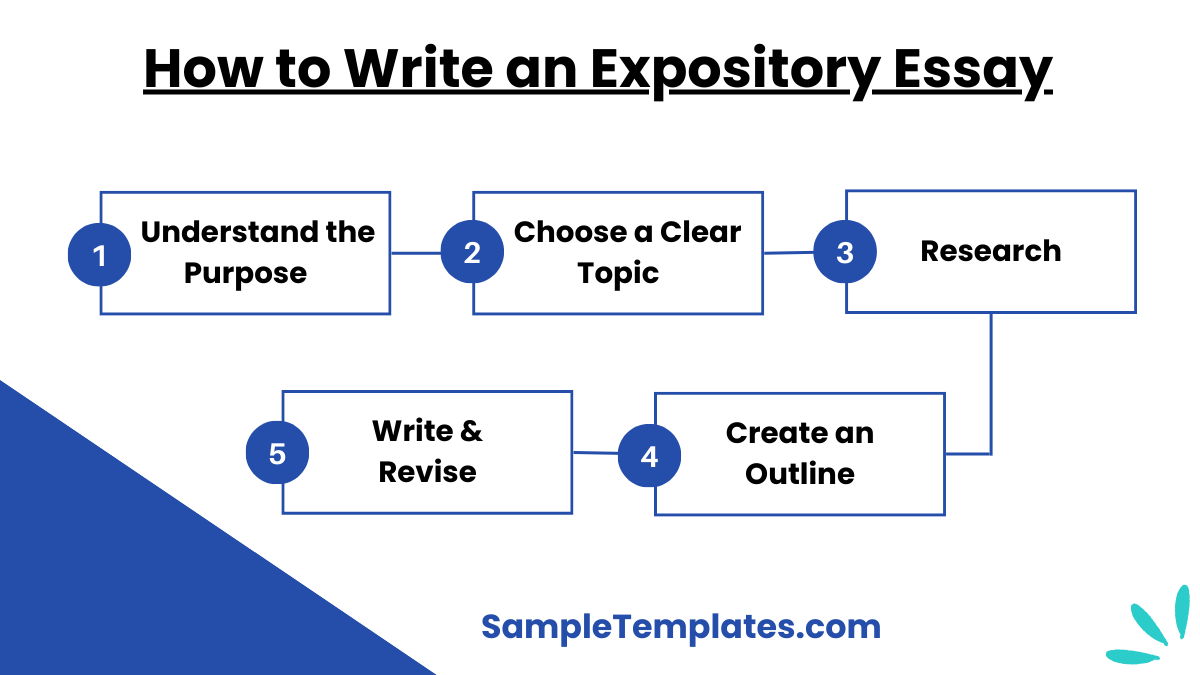
- Understand the Purpose:
- An expository essay aims to explain, describe, or inform readers about a specific topic.
- Avoid expressing personal opinions or arguments; focus on providing factual and logical information.
- Choose a Clear Topic:
- Select a topic that is specific and manageable.
- Ensure there is enough information available to explore and explain the topic thoroughly.
- Conduct Thorough Research:
- Gather relevant information from credible sources such as books, academic journals, and reputable websites. You can also see more on Expository Writing.
- Take notes and organize your findings logically to help structure your essay.
- Create an Outline:
- Introduction: Introduce the topic and provide background information. End with a clear thesis statement that outlines the main points.
- Body Paragraphs: Each paragraph should focus on a single point that supports your thesis. Use evidence and examples to explain your points.
- Conclusion: Summarize the main points and restate the thesis in a new way. Highlight the significance of the topic.
- Write and Revise:
- Write the first draft following your outline. Ensure clarity, coherence, and logical flow.
- Revise for content, checking for completeness and accuracy. Ensure each paragraph transitions smoothly to the next. You can also see more Informative Essay.
- Proofread for grammar, spelling, and punctuation errors. Consider getting feedback from peers or mentors to improve the quality of your essay.
Expository Essay Sample
Expository and Narrative Essay
5 Types of Expository Essays
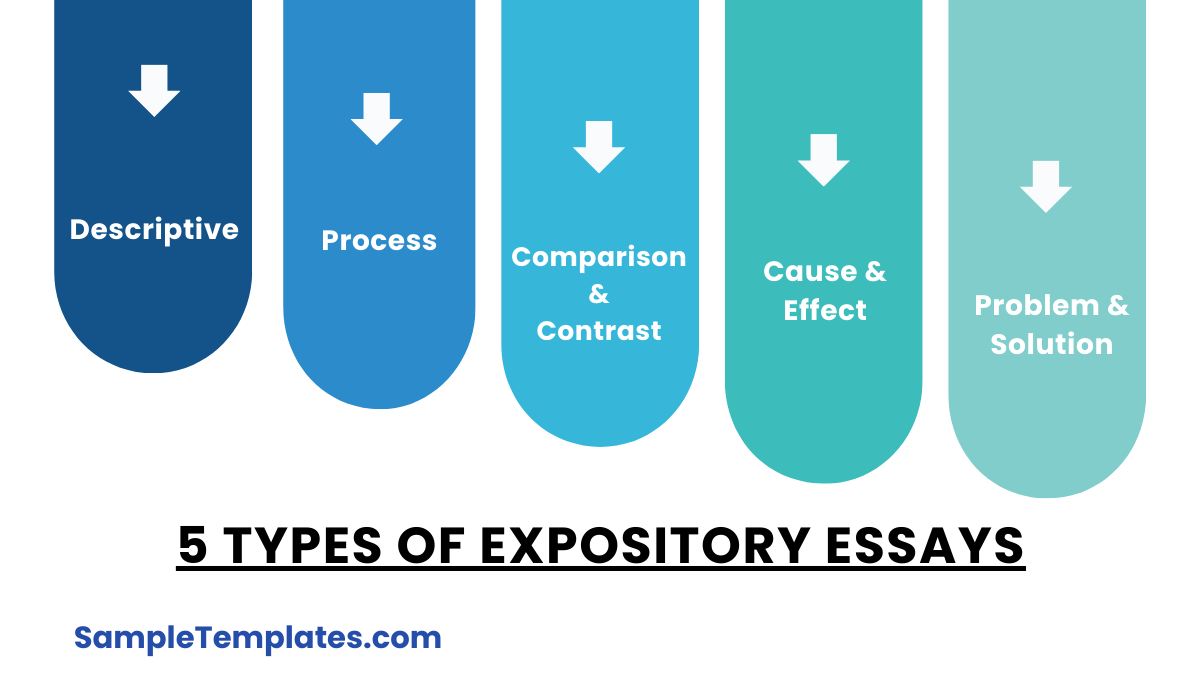
- Descriptive Essays:
- Purpose: To describe a person, place, object, or event in detail.
- Features: Uses sensory details to create a vivid picture for the reader. Focuses on providing a comprehensive description without personal bias.
- Example: An essay structure describing the sights, sounds, and atmosphere of a bustling city market.
- Process Essays:
- Purpose: To explain how something is done or how to do something.
- Features: Presents a step-by-step guide or instructions. Often includes chronological order and clear, concise language.
- Example: An essay outline detailing how to bake a chocolate cake, outlining each step from gathering ingredients to final decoration.
- Comparison and Contrast Essays:
- Purpose: To compare and contrast two or more subjects.
- Features: Highlights similarities and differences between the subjects. Can be structured in a point-by-point or block format.
- Example: An essay comparing and contrasting traditional classroom education with online learning.
- Cause and Effect Essays:
- Purpose: To explain the reasons why something happened (cause) and the results of its occurrence (effect).
- Features: Analyzes the relationship between events or conditions. Can focus on either causes, effects, or both.
- Example: An essay exploring the causes and effects of climate change on global weather patterns.
- Problem and Solution Essays:
- Purpose: To identify a problem and propose one or more solutions.
- Features: Clearly defines the problem, analyzes it, and then presents viable solutions. Often includes evidence and arguments to support the proposed solutions.
- Example: An essay discussing the problem of plastic pollution in oceans and suggesting ways to reduce plastic waste. You can also see more on 5 Paragraph Essay.
Expository Essay Outline Form
Expository Essays
Before we begin, be informed that while expository essays are most widely used in the academic setting, this is not the type of essay you write when trying to apply for college or a scholarship. For that, see these Sample Scholarship Essays.
These College Essay Examples are great examples of expository essays. These are similar to a thesis paper that is used in the academic setting. It requires students (or researchers) to explore and investigate ideas, evaluate evidence, expound on the idea, and come up with an argument or hypothesis concerning the idea in a clear and organized manner. This can be accomplished in these basic steps:
-
Select a topic. Make sure that the topic you choose is specific and narrow enough that you would have the time and resources to investigate and study its entire scope. For example, instead of an essay on consumer behavior, consider narrowing your topic down to factors that influence risk-taking in consumers when online shopping.
-
Write your thesis statement. This is a one-sentence line you would answer at the conclusion of your essay.
-
Select a method of development. Know the different research methods there are and select which one is most appropriate with your chosen topic.
-
Organize the essay. Begin by creating an sample outline. Decide which ideas go to which paragraph and fill in the evidences you’ve gathered to support each body paragraph.
-
Write a topic sentence for each paragraph. For each paragraph, make sure to have one topic sentence that relates directly to the main topic. Also, remember to find a smooth transition between paragraphs.
-
Write a body paragraph for your essay. Each paragraph should have an evidence and explanation that supports your main topic.
-
Create your introduction. Now that you have a body and know the contents of your essay, it should be easier to write an introduction. After all, how do you introduce something of which you don’t know?
-
Write a concluding paragraph. End your essay with a strong conclusion. Restate your thesis statement and give a quick summary of your supporting grounds. End with a call to action and absolutely avoid leaving your reader hanging.
For other types of essays, we also have Descriptive Essay Samples and more available on site.
Expository Essay Rubric Format
Social Media Expository Essay
Tips For Writing a Expository Essay
- Understand the Prompt:
- Carefully read the essay prompt or assignment to ensure you understand what is being asked. Determine the type of expository essay required and the key points you need to address.
- Plan and Outline:
- Create a detailed outline before you start writing. This should include an introduction, body paragraphs, and a conclusion. sample planning helps organize your thoughts and ensures a logical flow.
- Start with a Strong Thesis Statement:
- Craft a clear and concise thesis statement that outlines the main points of your essay. This statement will guide your writing and keep you focused on the topic.
- Use Clear and Concise Language:
- Avoid overly complex sentences and jargon. Use straightforward language to make your essay easy to understand. Each sentence should contribute to explaining or informing about the topic.
- Support with Evidence:
- Use factual information, statistics, examples, and quotes from credible sources to support your points. Ensure all evidence is relevant and strengthens your arguments. You can also see more on Narrative Essay.
- Maintain a Logical Structure:
- Each paragraph should have a clear main idea and be linked logically to the next. Use transitions to ensure smooth flow between paragraphs and maintain coherence throughout the essay.
- Avoid Personal Opinions and Bias:
- Stick to facts and objective information. An expository essay is not the place for personal opinions or persuasive language. Your goal is to inform, not to convince.
- Revise and Edit:
- After writing the first draft, take time to revise and improve your essay. Check for clarity, coherence, and logical flow. Edit for grammar, punctuation, and spelling errors. Consider seeking sample feedback from peers or mentors to further refine your work.
Expository Argumentative Essay
What are the 3 main points of an expository essay?
The three main points of an expository essay are the introduction with a thesis statement, body paragraphs presenting factual evidence and explanations, and a conclusion summarizing the main ideas and restating the thesis.
What is the difference between expository and descriptive essay?
An expository essay explains or informs about a topic using facts and logic, while a descriptive essay creates a vivid picture of a subject through detailed sensory descriptions and observations.
What are 2 things you should avoid in an expository essay?
Avoid personal opinions and persuasive language, as well as using biased or unreliable sources. Stick to objective, factual information to maintain the essay’s informative nature. You can also see more on Evaluation Essay.
What is the main purpose of an expository text?
The main purpose of an expository text is to explain, inform, or clarify a topic by presenting facts, evidence, and logical arguments in a clear and straightforward manner.
In conclusion, the evidence and analysis presented underscore the complexity of the topic, revealing its multifaceted nature. Understanding these dimensions enhances our comprehension and highlights the importance of informed perspectives in addressing the issue effectively.
Related Posts
FREE 10+ Essay Introduction Samples in PDF
FREE 6+ Essay Organizer Samples in PDF | MS Word | Google Docs
FREE 10+ 5 Paragraph Essay Samples in PDF | MS Word | Apple Pages
FREE 10+ Argument Essay Samples in MS Word | Google Docs | PDF
FREE 10+ Research Essay Outline Samples in PDF | MS Word | Apple Pages
FREE 10+ Templates for Persuasive Essay Samples in PDF
FREE 10+ Essay Conclusion Samples in PDF
FREE 4+ MLA Format Essay Samples in PDF
FREE 10+ Leadership Essay Samples in MS Word | PDF
FREE 10+ Narrative Essay Outline Samples in PDF | MS Word | Google Docs
FREE 10+ APA Essay Samples in MS Word | Google Docs | PDF
FREE 10+ Research Paper Essay Samples in MS Word | Google Docs | PDF
FREE 8+ Sample Narrative Essay Templates in MS Word | PDF
FREE 10+ Community College Essay Samples [ Service, Builder, Transfer ]
FREE 10+ Admission Essay Samples [ College, Graduate, Nursing ]
